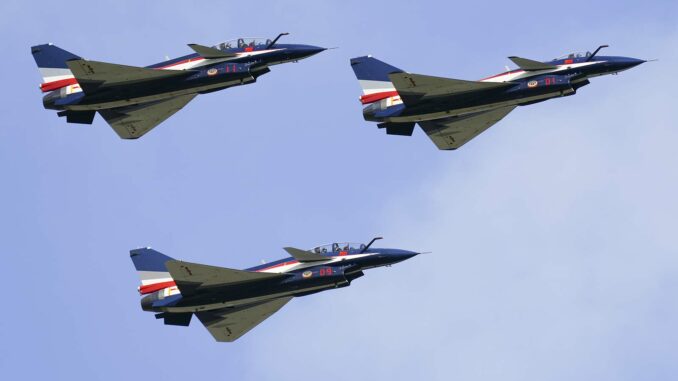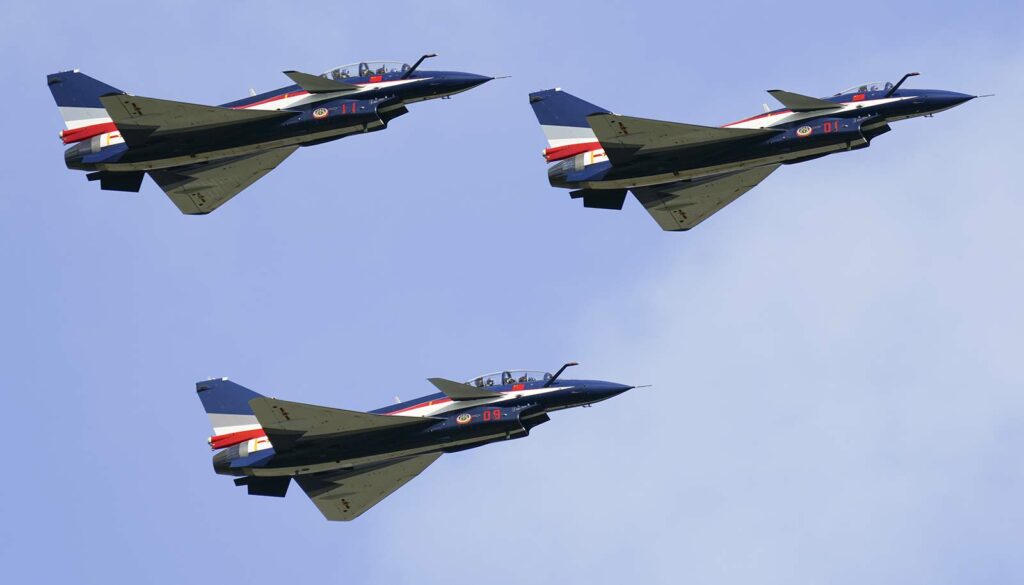
China has recently stepped up its military pressure on Taiwan, sending 43 military aircraft and 7 ships near the autonomous island. This article explores recent developments in this tense situation, the implications for Taiwan and the region, and the defensive measures put in place by Taiwan to cope with this growing pressure.
Rising military tension near Taiwan
The situation in the Taiwan Strait has intensified even further recently, as China sent an impressive military deployment near the autonomous island. Taiwanese authorities reported that 43 military aircraft and 7 Chinese vessels had been spotted in the surrounding waters. This show of force is part of Beijing’s persistent campaign of harassment, threats and intimidation against Taiwan.
Alarming figures
Taiwan’s Ministry of Defense released these alarming figures for the 24-hour period up to 6:00 a.m. on Wednesday. Of the 43 aircraft, 37 are said to have crossed the median line of the Taiwan Strait, which China no longer recognizes as an informal border between the two sides. This incursion into Taiwanese waters was closely monitored by the Taiwanese authorities, who reacted swiftly by dispatching fighter jets, mobilizing ships and activating ground-based missile systems. These measures are part of the standard response to Chinese military activities near Taiwan, which include penetrating Taiwan’s air defense identification zone, but not violating its airspace itself.
Background to rising tensions
Since the visit of Nancy Pelosi, then Speaker of the U.S. House of Representatives, to Taiwan in August 2022, Chinese military maneuvers near the island have multiplied and become more aggressive. China suspended military communications with the U.S. to express its displeasure with the visit, considering Taiwan a part of its territory to be reunited by force if necessary.
Objectives of the Chinese maneuvers
The Chinese military maneuvers near Taiwan have several strategic objectives. Firstly, they aim to weaken Taiwanese morale by exhausting its pilots and personnel, while wearing down the island’s military hardware. Despite these pressures, Taiwan’s de facto independence remains widely popular among the island’s voters, and the defense budget has been increased to buy new equipment from the USA, its main ally, and to produce some items locally, notably submarines.
Threatening Chinese statements
At an international defense forum in Beijing, General Zhang Youxia, China’s second-highest-ranking military official, reiterated the Chinese government’s threats to any attempt to formally establish Taiwanese independence. He declared that “no matter who tries to separate Taiwan from China in any way, China and the Chinese military will never allow it.”
These statements reaffirm China’s uncompromising stance on Taiwan and underline its commitment to eventual forced reunification. General Zhang Youxia is also vice-chairman of the Central Military Commission, which oversees the world’s largest standing army.
Uncertainties over Chinese leadership
At the Beijing event, attended by military representatives from dozens of countries, China sought to assert its regional leadership and strengthen military cooperation. This comes despite tensions with the USA, Japan over a group of uninhabited islands in the East China Sea, with its Southeast Asian neighbors over China’s claim to almost the entire South China Sea, and with India along their disputed border.
However, an element of uncertainty emerged at the event. China’s Defense Minister, General Li Shangfu, did not speak as would have been expected. What’s more, he had been relieved of his duties the previous week, after a two-month absence from public life. No explanation was given by the Chinese government for his dismissal.

Possible resumption of military dialogue between the USA and China
Despite the tensions, it seems that Washington and Beijing are considering a possible resumption of military dialogue. At the forum, the USA was represented by a delegation led by Cynthia Carras, the Defense Department’s top official for China. So far, however, she appears to have left without holding any formal meetings with Chinese officials or making any statements to the press.
Regional consequences and implications for Taiwan
Rising military tensions near Taiwan have important consequences for the region and for Taiwan itself. Firstly, it underscores Taiwan’s strategic importance in the Asia-Pacific region and the ongoing rivalry between China and the United States. China’s presence in the Taiwan Strait and its territorial claims in the South China Sea create major regional tensions.
For Taiwan, increasing military pressure means that it must continually strengthen its defense and maintain its level of preparedness at the highest level. The island relies on U.S. support for its security, but is also seeking to strengthen its own military capabilities.
China’s recent intensification of military pressure near Taiwan underscores the region’s strategic importance and ongoing tensions in the Asia-Pacific region. The implications of these military maneuvers go beyond Taiwan’s borders, as they have an impact on regional stability. Taiwan, for its part, must remain vigilant and prepared for any eventuality, while continuing to seek a delicate balance between asserting its de facto independence and managing its relations with mainland China.
War Wings Daily is an independant magazine.